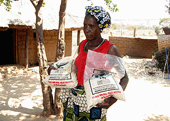Zambia: Women for Change strengthens political participation
Published on Tue, 2011-06-07 23:45
Sources Women for Change (WfC, focal point of Social Watch in Zambia) has been working for months to increase the participation of citizens, women and men, in the campaign towards the general elections to be held next September. “The Zambia We Want” initiative launched last year aims at building the capacity of citizens, elected leaders and other duty bearers to engage meaningfully in the democratic process. WfC promotes a meaningful citizen-leaders dialogue based on mutual accountability; it empowers citizens to demand policies that promote good governance; and develops a continuous monitoring of the electoral promises. “The civil society organisations noted that Zambia's development was driven by a small elite group --the politicians. These people set the country's development agenda without the full participation of the majority of Zambians, contrary to the idea of Zambia being for all Zambians,” wrote Mathews Liyani for last edition of WfC's newsletter. WfC's activities are based on the principle of non-partisan collaboration with civic, political and other organisations on matters concerning the development of rural communities. “The return to multi-party politics raised hopes amongst Zambia's citizens for democratic governance that would lead to individual and collective The Zambia We Want campaign builds an informed and assertive citizenry using radio programmes and a documentary for the general public, where people express their visions for the country. A collectively developed The campaign also wants Zambian political parties to increase the number of female candidates in this year's municipal, parliamentary and presidential elections. WfC also entail to enhance rural women's active participation in their communities. The number of women participating in governance and taking up leadership positions at household and community levels is WfC focus on raising awareness on gender and the promotion of equality between women and men, it defends women’s rights, helps them generate additional income, advocates for poverty eradication policies and addresses the effects of HIV-AIDS. These activities have been well received by the communities, including traditional leaders, who were encouraged to take the lead in efforts aimed at bringing development |
SUSCRIBE TO OUR NEWSLETTER



